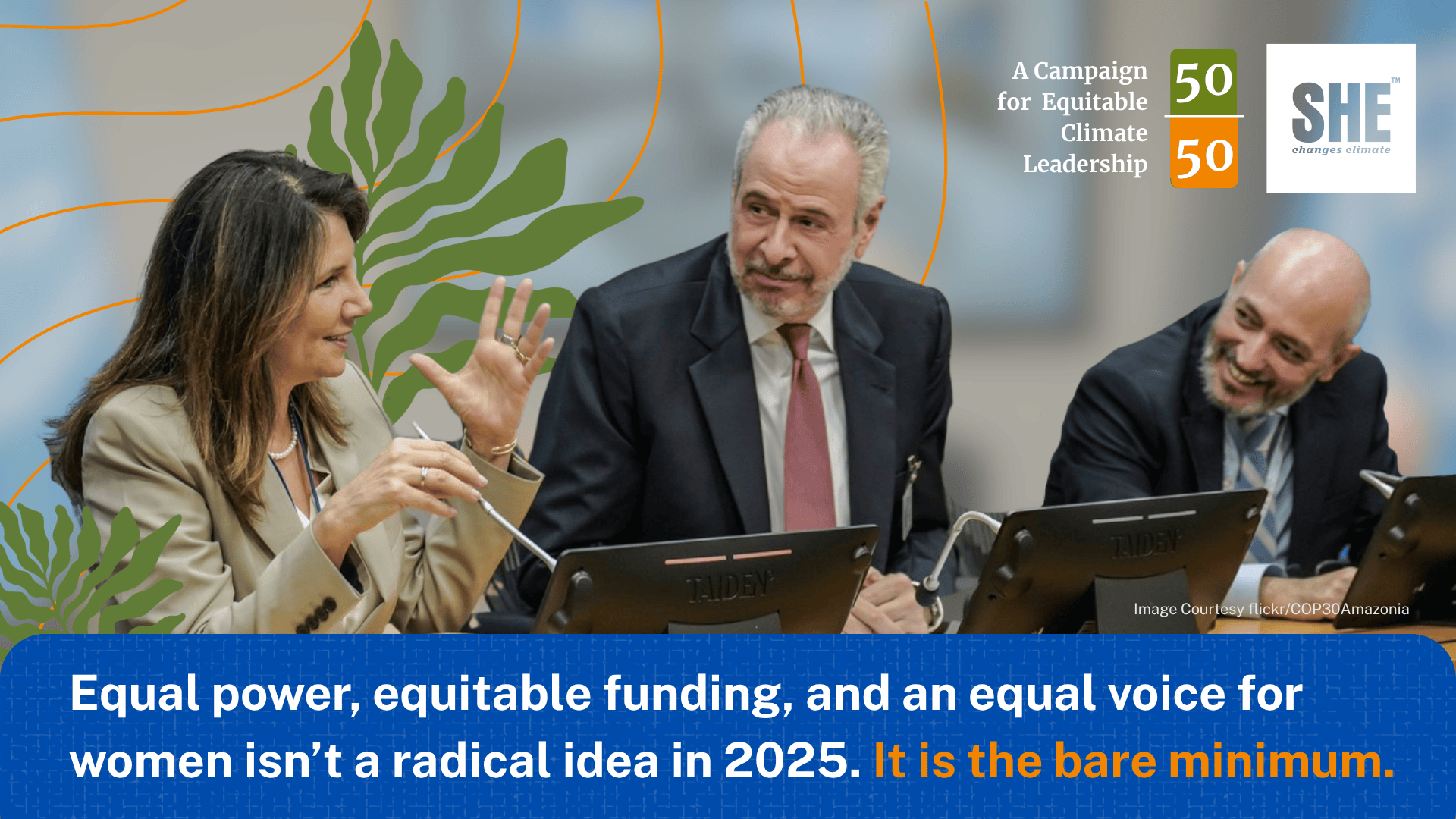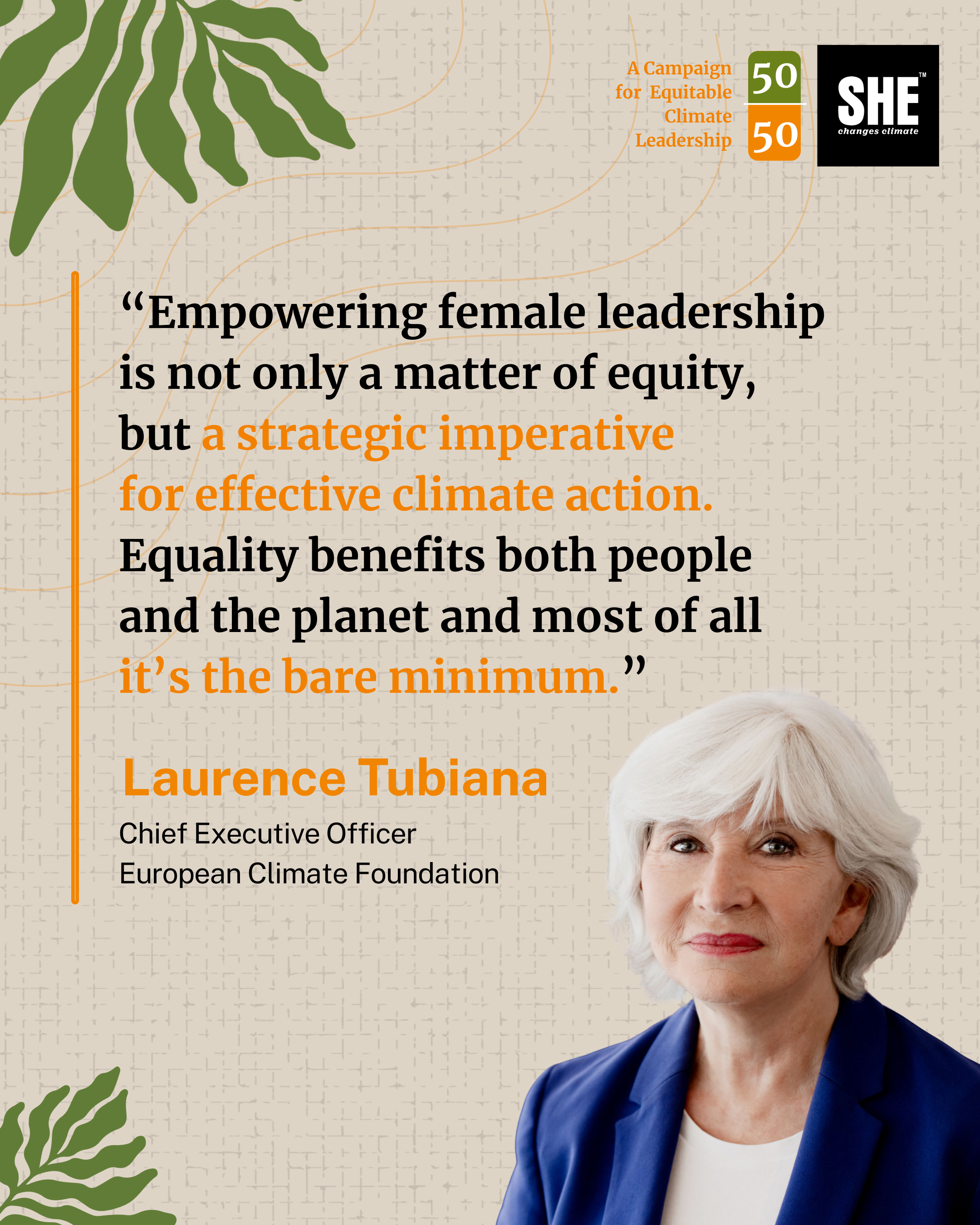Announcing 50/50: A Campaign for Equitable Climate Leadership
Because half measures don’t work
Equal power, equitable funding, and an equal voice for women isn’t a radical idea in 2025. It is the bare minimum.
Climate change is the biggest collective test of our time. Yet the response to it is being designed without equal representation, investment and agency for nearly half the world’s population. At last year’s COP, women made up only 35% of national delegates—a figure that has remained stubbornly unchanged for the past decade.
At this rate, true gender balance in climate decision-making may not be achieved until 2043. That’s nearly two decades away. For a planet in crisis, it is too little, too late. This gap is costing us dearly. Decisions are narrower, investments less effective, policies less rooted in the realities of communities.
Which is why SHE Changes Climate is announcing its 50/50 Campaign: a global call demanding women have Equal Participation, Equitable Investment, and Equal Policy Power in climate action.
This campaign calls for women’s equal leadership at COP30 in Belém to be treated as non-negotiable.
As a climate veteran, I have witnessed many women standing up in a male-dominated world, bringing forth innovative ideas and novel approaches. COP30 will convene in a key democratic nation, so it is more crucial than ever to recognize that empowering female leadership is not only a matter of equity, but a strategic imperative for effective climate action. Equality benefits both people and planet and most of all it’s the bare minimum.— Laurence Tubiana, CEO of the European Climate Foundation
Equal Participation: More than just a seat at the table
Any global problem can only be solved with equal representation of the global population. Climate negotiations remain overwhelmingly led by and dominated by men—only 2% of country delegations at COP28 had equal numbers of women and men. And in the last decade, women headed merely 20% of delegations on average. Women, especially from the Global South and Indigenous communities, are often excluded or underrepresented in the halls of power. This imbalance is not only unjust. It weakens climate outcomes.
Data proves it. Countries with more women in their parliaments are more likely to ratify environmental treaties and adopt stronger climate policies.
The campaign 50/50 demands governments commit to equal gender balance in delegations, leadership and beyond. It’s not a token gesture. It’s the minimum condition.
Brazil is going into COP30 with the conviction that there is no climate justice without gender equality. Women have been leading innovative solutions across all territories — from the Amazon to the cities, from rural areas to urban peripheries — confronting climate crises with knowledge, science, and solidarity. The Government of Brazil is committed to ensuring that women’s leadership is at the center of global decision-making and solutions, guiding policies, investments, and international agreements. When women lead, climate action gains direction and purpose. And that is how we will build a future of climate justice, equality, and democracy.— Márcia Lopes, Minister for Women in Brazil
Equitable Investment: Funding just-climate solutions
Climate finance today is failing women. Globally, a meagre 2.9% of climate-related finance projects, identify gender equality as their principal objective. This chronic under-investment persists despite women’s proven track record in building resilient communities and leading innovative solutions on the frontlines of climate change. From rural farms in Kenya to coastal conservation projects in India, women are spearheading climate solutions—often on shoestring budgets and against great odds.
Investing in these efforts isn’t charity. It’s a smart climate strategy— backed by evidence, time and again. Climate interventions become more effective and sustainable when they include and empower women—who often act as “benefit multipliers,” maximizing the social and environmental impacts of projects in their communities.
The 50/50 Campaign calls for urgent action to make gender equality in climate finance a principal objective. Because we cannot keep underfunding the very people already proving they can deliver.
Equal Policy Power: Writing the rules
While the recognition of gender in Nationally Determined Contributions—climate action plans under the Paris agreement—has improved over the years, from 15% to 71%, there are few countries that embed gender-responsive measures to shift power and resources into their national climate strategies. 49% of developing countries do not have tools to measure, monitor and budget for gendered climate impacts. And mere 6% make gender a criteria for prioritizing action.
These blind spots translate into policies that ignore women’s realities and opportunities, and further fail to protect or empower women, who are among those most affected by climate change.
As COP30 in Belém approaches, governments must submit gender-responsive plans—with data, indicators, and accountability built in. Climate policy that ignores women is ineffective.
Why Now?
We are running out of time. The next decade must be a decade of action: transforming climate promises into tangible results. COP30 is expected to adopt the extended Gender Action Plan. This is the moment to lock in equality, not as a side note, but as a strong pillar of climate ambition.
From Brazil to Kenya to India to Nepal to Zimbabwe, women are already leading and innovating across energy access, food systems, conservation, and adaptation. Their work is proof: when women lead, climate action is bolder, fairer, and more sustainable.
The Call: No more half measures.
50/50 is not a radical demand. It is the bare minimum. Equal participation. Equitable investment. Equal policy power. Anything less is failure by design. And achieving this in climate leadership is an urgent task – one to be actioned not tomorrow or “someday,” but starting today.
This campaign is a rallying cry: to governments, institutions, and financiers. To stop talking about women as beneficiaries and start recognising them as leaders. To stop sidelining and start scaling. To act as though our survival depends on it – because it does.


